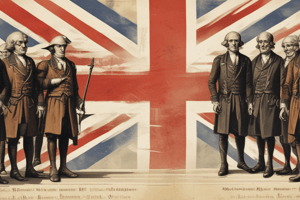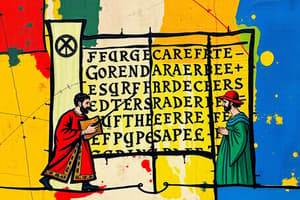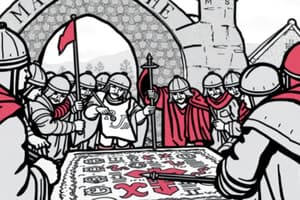Podcast
Questions and Answers
What was the original purpose of Magna Carta?
What was the original purpose of Magna Carta?
- To make peace between King John and rebel barons (correct)
- To establish a new government system
- To protect church lands
- To create a new tax system
What did the charter promise?
What did the charter promise?
- Protection of church rights, protection for the barons from legal imprisonment, access to slow justice, and limitations on feudal payments to the Crown
- Protection of the King's rights, protection for the barons from illegal imprisonment, access to swift justice, and limitations on feudal payments to the Church
- Protection of church rights, protection for the barons from illegal imprisonment, access to swift justice, and limitations on feudal payments to the Crown (correct)
- Protection of the King's rights, protection for the barons from legal imprisonment, access to slow justice, and limitations on feudal payments to the Church
What was the outcome of the annulment of Magna Carta by Pope Innocent III?
What was the outcome of the annulment of Magna Carta by Pope Innocent III?
- The Hundred Years' War
- The Second Barons' War
- The First Barons' War (correct)
- The War of the Roses
When was Magna Carta reissued stripped of some of its more radical content?
When was Magna Carta reissued stripped of some of its more radical content?
What was the Charter of the Forest?
What was the Charter of the Forest?
What was the significance of Edward I's reissuing of the Charters of 1225 in 1297?
What was the significance of Edward I's reissuing of the Charters of 1225 in 1297?
What was the significance of the Provisions of Oxford?
What was the significance of the Provisions of Oxford?
What was the significance of the Glorious Revolution?
What was the significance of the Glorious Revolution?
How is Magna Carta viewed in modern times?
How is Magna Carta viewed in modern times?
Flashcards
Magna Carta
Magna Carta
A royal charter of rights agreed to by King John of England in 1215, promising protection of church rights, access to justice, and limitations on feudal payments.
Council of Twenty-Five Barons
Council of Twenty-Five Barons
A council of 25 barons created to monitor King John's conduct, under clause 61 of the Magna Carta.
Charter of the Forest
Charter of the Forest
Issued in 1217, it pardoned existing forest offenses, controlled forest courts, and reviewed forest boundaries.
Reissuance of Magna Carta (1297)
Reissuance of Magna Carta (1297)
Signup and view all the flashcards
Confirmatio Cartarum
Confirmatio Cartarum
Signup and view all the flashcards
Articuli super Cartas
Articuli super Cartas
Signup and view all the flashcards
Sir Edward Coke
Sir Edward Coke
Signup and view all the flashcards
Magna Carta's Rights
Magna Carta's Rights
Signup and view all the flashcards
Whig Interpretation of Magna Carta
Whig Interpretation of Magna Carta
Signup and view all the flashcards
Study Notes
English Charter of Freedoms, 1215
-
Magna Carta was a royal charter of rights agreed to by King John of England at Runnymede, near Windsor, on 15 June 1215.
-
It was first drafted by the Archbishop of Canterbury, Cardinal Stephen Langton, to make peace between the unpopular king and a group of rebel barons.
-
The charter promised the protection of church rights, protection for the barons from illegal imprisonment, access to swift justice, and limitations on feudal payments to the Crown, to be implemented through a council of 25 barons.
-
The charter was annulled by Pope Innocent III, leading to the First Barons' War.
-
After John's death, the regency government of his young son, Henry III, reissued the document in 1216, stripped of some of its more radical content.
-
At the end of the war in 1217, it formed part of the peace treaty agreed at Lambeth, where the document acquired the name "Magna Carta".
-
The charter became part of English political life and was typically renewed by each monarch in turn.
-
The political myth of Magna Carta and its protection of ancient personal liberties persisted after the Glorious Revolution of 1688 until well into the 19th century.
-
Magna Carta influenced the formation of the United States Constitution, which became the supreme law of the land in the new republic of the United States.
-
Four clauses of the original charter (1 (part), 13, 39 and 40) are enshrined in the 1297 reissued Magna Carta and do still remain in force in England and Wales.
-
Magna Carta still forms an important symbol of liberty today, often cited by politicians and campaigners.
-
Four exemplifications of the original 1215 charter remain in existence, two at the British Library, one at Lincoln Castle and one at Salisbury Cathedral.The History and Significance of Magna Carta
-
The Council of Twenty-Five Barons was appointed under clause 61 of the Magna Carta to monitor King John's future conduct.
-
The papal commissioners excommunicated the rebel barons in September 1215, acting on instructions earlier received from Rome.
-
The Charter of 1215 was resurrected under the new government of the young Henry III as a way of drawing support away from the rebel faction.
-
The Great Charter of 1217 was similar to the 1216 version, with additional clauses to protect the rights of the barons over their feudal subjects.
-
The Charter of the Forest was created in 1217, pardoning existing forest offences, imposing new controls over the forest courts, and establishing a review of the forest boundaries.
-
Magna Carta was reissued in 1225 by King Henry III, declaring that the charters were issued of his own "spontaneous and free will" and confirmed them with the royal seal.
-
In 1258, a group of barons seized power from Henry in a coup d'état, citing the need to strictly enforce Magna Carta and the Charter of the Forest, creating a new baronial-led government to advance reform through the Provisions of Oxford.
-
King Edward I reissued the Charters of 1225 in 1297 in return for a new tax, and this version remains in statute today.
-
The Confirmatio Cartarum (Confirmation of Charters) was issued in Norman French by Edward I in 1297, confirming Magna Carta and the Forest Charter.
-
With the reconfirmation of the Charters in 1300, an additional document was granted, the Articuli super Cartas (The Articles upon the Charters).
-
Magna Carta was referred to in legal cases throughout the medieval period, and it was possible to bring a case against the King's officers, such as his sheriffs, using the argument that the King's officers were acting contrary to liberties granted by the King in the charters.
-
Medieval cases referred to the clauses in Magna Carta which dealt with specific issues such as wardship and dower, debt collection, and keeping rivers free for navigation.
-
Magna Carta's influence on English medieval law was significant and long-lasting.The Evolution of Magna Carta: From 14th Century to the United States Constitution
-
By 1350, half of the clauses of Magna Carta were no longer actively used.
-
Between the 13th and 15th centuries, Magna Carta was reconfirmed 32 times, and possibly as many as 45 times.
-
By the mid-15th century, Magna Carta ceased to occupy a central role in English political life.
-
During the 16th century, the interpretation of Magna Carta shifted, especially under Henry VII and Henry VIII.
-
The first mechanically printed edition of Magna Carta was published by Richard Pynson in 1508.
-
In 1534, George Ferrers published the first unabridged English-language edition of Magna Carta, dividing the Charter into 37 numbered clauses.
-
During the 17th century, Magna Carta became increasingly important as a political document in arguments over the authority of the English monarchy.
-
Sir Edward Coke was a leader in using Magna Carta as a political tool during this period.
-
The Glorious Revolution marked a setback for the course of English historiography.
-
The United States Constitution includes phrases derived from Magna Carta, such as the Fifth Amendment and the Suspension Clause.
-
The Massachusetts Body of Liberties contained similarities to clause 29 of Magna Carta.
-
American colonists fought against Britain, preserving liberties and rights that they believed to be enshrined in Magna Carta.The Legacy of Magna Carta
-
Magna Carta's rights were preserved unless explicitly curtailed.
-
The U.S. Supreme Court referenced Edward Coke's analysis of Magna Carta as an antecedent of the Sixth Amendment's right to a speedy trial.
-
The Whig interpretation of Magna Carta remained dominant during the 19th century but began to recede in the 20th century.
-
Magna Carta became popular in literary representations of the medieval past to preserve the social status quo or challenge perceived economic injustices.
-
Magna Carta carries little legal weight in modern Britain, but it remains part of the uncodified constitution of the United Kingdom.
-
Magna Carta is still a topic of great interest to historians and has a powerful iconic status in British society.
-
Magna Carta is generally considered part of the uncodified constitution of the United Kingdom.
-
Magna Carta was reprinted in New Zealand in 1881 as one of the Imperial Acts in force there.
-
Magna Carta continues to be honoured in the United States as an antecedent of the United States Constitution and Bill of Rights.
-
The 800th anniversary of the original charter occurred on 15 June 2015, and organisations and institutions planned celebratory events.
-
At least thirteen original copies of the charter of 1215 were issued by the royal chancery during that year, seven in the first tranche distributed on 24 June and another six later.
-
Of these documents, only four survive, all held in England: two now at the British Library, one at Salisbury Cathedral, and one, the property of Lincoln Cathedral, on permanent loan to Lincoln Castle.
Studying That Suits You
Use AI to generate personalized quizzes and flashcards to suit your learning preferences.




